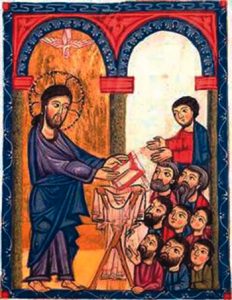Faith and Belief – the Difference
One of the great religious figures in Christchurch for many years in the latter part of the last century was the late Fr Cecil Dennehy, CSSR. Fr Ces was beloved by all who knew him. He was a man of 60 years pastoral experience, giving missions and retreats on both sides of the Tasman.
From time to time, waving his arms in mock horror, he would proclaim to all and sundry, ‘They’ve lost the faith! They’ve lost the faith!’ He would be responding to some mind-numbing decree that had just come from Rome or some other authoritative source, relating to a matter which made little pastoral sense to him.
I’ve often been reminded of him when yet another decree arrives from somewhere making mandatory things which make little if any pastoral sense. It has led me to reaffirm that there is a clear distinction between belief and faith.
It has led me to reaffirm that there is a clear distinction between belief and faith
Belief relates to things we perceive to be true and are prepared to accept as being factual. In the secular world, they can be such things like the belief that Maori were the first settlers in Aotearoa, that Monte Carlo won the first NZ Trotting Cup in 1908, that Henry VIII ruled England, that a potato famine starved one million people in Ireland between 1845–52. None of us were there to witness any of these events. But we accept that these facts are true - and we believe them. They form part of our belief system.
When it comes to religious matters, Catholics accept that Jesus, the Nazarene, was both the human and divine Son of God, that baptism is the first sacrament, that the trans-substantiated bread and wine at the Eucharist are the living presence of the Risen Christ, that there is one God but three persons within that one being. These and many more similar statements form part of the mystery of our Catholic faith. We believe them without scientific proof. We accept them. These form our beliefs.
Living Faith
But acceptance of such things does not constitute living faith. And that is what Fr Ces was referring to. We can believe a wide variety of Catholic teachings and hold them as true. But that is not the same as having a living faith.
It is possible to argue that some people holding all these official teachings, may still have no faith. Or at best, little faith. The scribes and Pharisees, ‘the clergy’ at the time of Jesus, were the custodians of the creedal beliefs handed down through nearly 2000 years since the time of Abraham and Sarah. Like Church teachings, they had been built on over the centuries to form a comprehensive set of beliefs which all Jewish people accepted. They were preached upon in synagogues all over the country every Sabbath.
Jesus inherited those teachings. He knew them well. That is why he had access to synagogues as he went about his preaching. Part of his message when he proclaimed that the Reign of God was at hand was to challenge at a very elemental level the degree of faith of the scribes and Pharisees. He called them very angry, condemnatory names - ‘hypocrites, liars, whitened sepulchres, wolves in sheep’s clothing.’ He accused them of ‘oppressing the poor and laying heavy burdens upon them,’ and strongly advised the people not to listen to them, ‘because they say one thing, and do another’. That’s savage!
In essence, he was saying that while they may have had a full set of religious beliefs which they utterly believed, they had little if any living faith. They lived by a set of written propositions. The dryness of their lives reflected it.
Living faith is a recognition of the presence in our lives of an energising Spirit, which guides our every action.
Living faith is a recognition of the presence in our lives of an energising Spirit, which guides our every action. It is a dynamic, life-giving grace by which we live each moment, day-to-day accompanied and guided by the Spirit. As Pope Francis challenges us, it involves trust in Providence and risk-taking for the sake of the Gospel. Obviously for most, it will be based on the ancient Creed, which is a major foundation stone upon which our living faith is built. But living faith is much more than a set of creedal beliefs. They are not the same thing. Co-operation with the power of the living Christ on a daily basis is a much more important foundation stone.
Pope Francis gave a massive dressing down to Vatican bureaucrats, including some cardinals, in his Christmas address. He challenged the absence of living faith among many, reflecting the aridity and dryness in their lives. He listed 15 ‘illnesses’ regarding how they lived out their beliefs. These included excessive pride, indifference, spiritual Alzheimer’s, the terrorism of gossip, cowardice, and ‘living an existential schizophrenia’. Harsh words indeed.
Like Jesus in his time, he demanded repentance. He challenged them to develop a living faith and not just stick to creedal beliefs. A true disciple needs both.
But, as Pope Francis pointed out so graphically, they are not the same.


 Entries(RSS)
Entries(RSS)